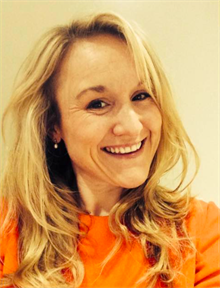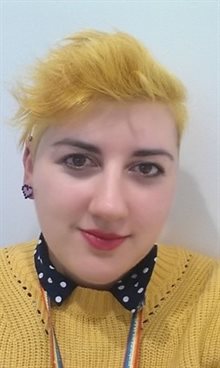
Hearing research at the University of Nottingham
We research hearing to help people who want to hear better. Increasing deaf awareness will also help with understanding how better to communicate with people who have hearing conditions.
People use hearing to talk to family and friends, listen to music, play games, and learn new things at school. People who cannot hear well or are deaf use sign language, lip-reading and/or hearing aids to do any or all of these.
Hearing research in (and for!) children

Rachael
Our research is looking at ways we can use information from the brain to know who might have difficulties with language and speech in the future. We do this using a machine called fNIRS. FNIRS uses harmless lasers to measure how the brain works when we think, listen or speak and is just like wearing a funny hat.
Problems with speaking and understanding what someone is saying can happen to people with and without hearing loss. Doctors use a lot of tools to find out which people struggle and how to help them. However, these tools don’t work for everyone and some people might need more help.

Sammi

If we can use this tool to see what is happening in the brain when we speak, listen, or make decisions, doctors can then use it in clinics. They can see who needs more help and to change their support to suit each person. This in turn can lead to better help for all people that struggle with speech and language!
Does hearing loss make you tired?
Sometimes, when our bodies or brains have been overworked, we get fatigued or tired. This means that we feel tired or we don’t have a lot of energy left to do important things, like schoolwork. It is normal for people to feel fatigued once in a while.
People with hearing loss have to work a lot harder to hear or take part in conversations than people without hearing loss. For example, they may have to read peoples lips and keep up with what people are saying. This can be pretty difficult in a busy classroom! Their brains are working so much harder than people without hearing loss, it can cause them to feel tired. This is known as listening fatigue.
It is important for scientists to be able to measure the amount of tiredness or listening fatigue a person is feeling to understand whether small things can make their fatigue better or worse. But the amount of tiredness or fatigue a person is feeling is very difficult to measure – it is not something you can do with a ruler!


Beth
Some people measure how tired a person is by asking them questions. However, if a person is in a happy mood when they are asked the questions, they may say that they are less tired than normal and if they are in a sad mood, they may say they are more tired than usual. Scientists are therefore trying to find a better way to measure fatigue in people. Once they have found this out, they can start trying to find ways to help reduce or prevent fatigue in people with hearing loss.
PhD student Beth Adams is exploring tiredness in children who have hearing loss in one ear.
Read more about the FUN Study
Understanding stress in children with hearing loss: cortisol study.
Would you and your child like to take part in Nottingham University research?
The study will involve filling in questionnaires and donating a few strands of hair from your child and getting your child to give a bit of saliva. You will receive a small inconvenience allowance for participating in this study.
Email Sally to join the pilot study or provide feedback on how the study should run
A meeting of minds?
Hello everyone! We are exploring what happens in the brains of parents and children when they play together. We are looking for mothers & children 3-4y11m old who mainly speak a language other than English at home to take part in our research study looking at brain scanning during play. This will have an impact on rehabilitation for children with cochlear implants.
The session will take roughly 1 hour at Ropewalk House in Nottingham City Centre. We will cover all travel expenses, provide a thank you gift voucher & certificate for each child. If you would like to participate, please get in touch with Nivy & do share this information to others who may be interested!
We greatly appreciate your help!
Email Nivy for more information or to take part
Hearing Research in (and for) adults
Hearing Sciences is a research group based in Nottingham and Glasgow. The focus of our research is quite broad, and includes understanding and alleviating hearing disability, assessing interventions for improving hearing (such as hearing aids and cochlear implants), and learning more about the way we hear and process sound.
Meet some of the researchers and get a taste of the research we do
My name is Lauren Hadley, and I look at how hearing loss affects conversation. While conversation seems easy, it actually involves a whole host of different mental processes. When listening to someone speak you not only need to take in what they're saying, but you need to figure out how to respond, and you need to come in for your own turn at the right time. And if it's difficult to hear your partner, for example due to a hearing loss or a noisy background, the task suddenly becomes a lot harder. But being able to guess what someone will say next can make it easier to process their speech, and being able to predict when they are going to finish can make it easier to respond appropriately. I look at the brain mechanisms involved in making these predictions while listening to someone speaking, in order to find new ways to help people with hearing loss.
Have you ever found it difficult to hear someone speaking to you in a noisy room? Listening in noise can be hard work for people with normal hearing and especially hard when you have hearing loss. We want to understand more about this.
We created an online experiment where people listened to sentences, for example ‘The clown had a funny face’. Some sentences were slightly noisy and so easier to understand whilst other sentences were very noisy and harder to understand. People recorded videos of themselves listening to these sentences and repeating what they heard out loud. They were also asked questions about how hard it was to understand the sentences. Sixty-seven young and older adults took part.
We will look at the results to try to understand whether there is a relationship between how hard people think the sentences were and how many sentences they got correct. We would also like to know if people gave up trying to understand the person talking when it was too noisy. Understanding how much effort it takes to listen to speech in noise could help us in the future to design better hearing aids that make listening easier.

Jammy Stacey
Emma Broome and Helen Henshaw describe some of their studies

Helen
Improving the use of amplification for adults with hearing loss
Hearing aids are provided free of charge by the NHS to people seeking help for their hearing loss. Benefits of using hearing aids include improved communication, social participation and quality of life. However, these positive outcomes rely on patients using their hearing aids regularly. Currently, the non-use and infrequent use of hearing aids by patients is high.
The aim of this research is to develop a tool designed to encourage people to use their hearing aids more regularly. First, we will identify what discourages and encourages hearing aid use by looking at published studies and by interviewing a range of adults with hearing loss who have been prescribed hearing aids. Next, we will use health behaviour change theory to understand what prevents hearing aid use and what behaviours the patient needs to change in order to help them use their hearing aids more regularly.
Finally, behaviour change techniques (the active ingredients of the tool to encourage patients change their behaviours) will be chosen according to what patients want and would be happy to use. Throughout development, we will ask people with hearing loss what they think of the tool and will make important changes to ensure it is easy to use, engaging and aligned to their needs.
Once the final tool has been developed, we will conduct a study to find out whether a large clinical trial to explore all of the benefits to patients and the NHS is possible.
Read the GAIN blog post
Practice Listening and Understanding Speech (PLUS)
This research aims to develop two new training games to improve listening and cognition for adults with hearing loss
There are 12 million people in the UK (around one in five of the population) with long-term hearing loss. The standard treatment for hearing loss is to amplify quiet sounds using hearing aids. Hearing aids are provided free of charge by the NHS to people seeking help for their hearing loss. However, hearing aids cannot restore lost hearing. Listening with hearing aids is challenging and requires additional cognitive effort (memory and attention), particularly in noisy and challenging everyday listening situations.
Our past research has shown that auditory training (listening games) can improve listening ability and cognition for adults with hearing loss and hearing aid users. In this study, we will develop two new listening games with hearing aid users. The games will use sounds and phrases that are relevant to hearing aid users. They will also be more cognitive challenging than previous listening games, to help boost training-related improvements.

Emma
The first game will train listeners to distinguish between different speech sounds while holding the sounds in memory. The second game will require listeners to follow the instructions of one person who is talking whilst ignoring a second person saying a similar sentence. In the future, we need a large clinical trial to understand all of the benefits of these listening games to hearing aid users and to the NHS. The final phase of this research will be to carry out a study to see if the large trial could work, and if so, how best to design it.
Research from a participant's perspective
Here Sarah describes what it was like for her and her child to take part in one of Rachael's studies
It has been an absolute pleasure taking part in Rachael’s research study; it’s so lovely to feel that we were helping someone that is trying to make things better, find things out and challenging the way things are… to make a difference. Right from the first email to arrange the visits we were made to feel so welcome. The study was made fun for my daughter and she really enjoyed her visits and looked forward to them. I found it interesting to see how my daughter did in all the activities and new challenges which also gave me some ideas of games to do at home. Things were adapted so well when my 2 year old wouldn’t do all the tasks and she still participated in other ways (the challenge of working with children!). Rachael was so understanding, and we didn’t feel any pressure. All of our expenses were covered which I didn’t expect, and it didn’t take much time at all. It’s so lovely to do something different and help; we feel privileged to be a part in research at Nottingham. After our last session, my daughter said ‘can we go and play games with Rachael next week?’ I feel that is the best feedback. Thank you, we cannot recommend helping with research enough!
Beethoven's Dream
Nottingham PhD student Yasmin Ali wrote about her personal interest in hearing research, driven by seeing the effect of hearing loss on her twin brother. Her article is beautifully written and touching and won the Nature journal’s international Young Scientist Essay Competition 2019.
Read Yasmin’s article on the Nature website
Interested in taking part?
We are always looking for more people to take part in our research. If you are interested, please send your name and state that you are interested in taking part to the email address at the bottom of the page, or simply use the button below. Much of our research is now online, so you can take part from the comfort of your own home. Participants receive small monetary rewards for taking part. You do not need to have any hearing difficulties to participate, we need people with all levels of hearing ability to take part in our research!
Learn more about hearing